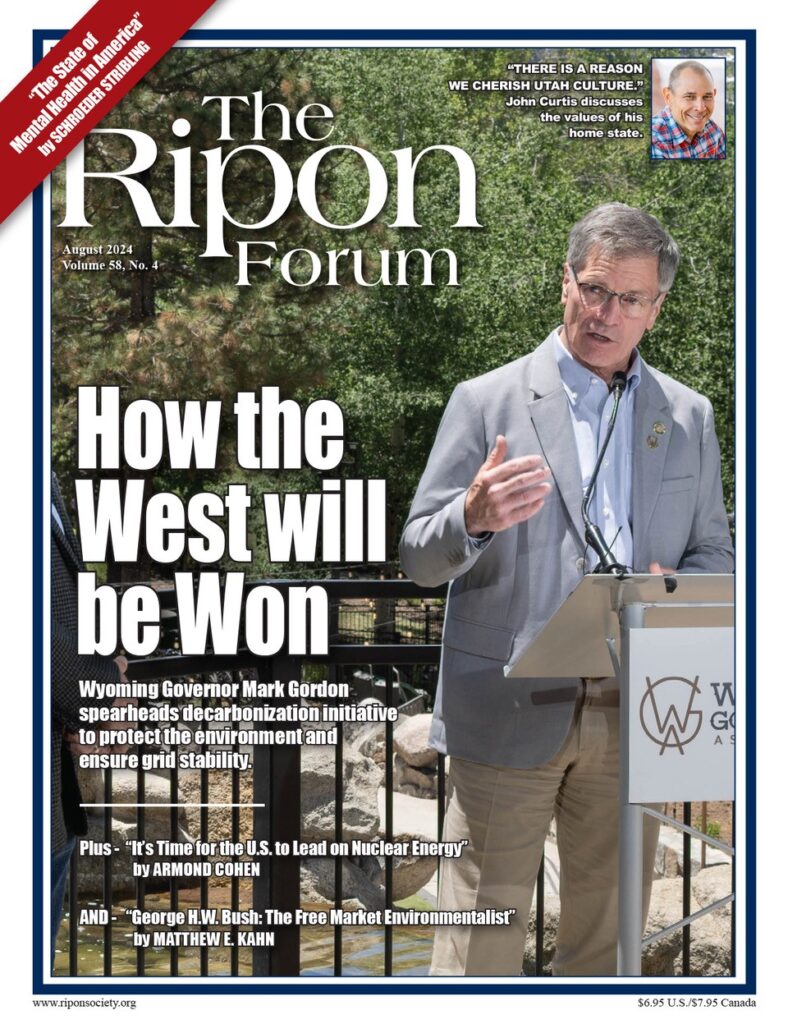
With energy demand rising and record high temperatures being set around the world, the latest edition of The Ripon Forum examines the bipartisan effort being led by a Western Governor to reduce the amount of carbon in the Earth’s atmosphere while at the same time pursuing an all-of-the-above energy approach.
The Governor is Mark Gordon of Wyoming. A Republican first elected in 2018, Gordon spent the past year serving as Chair of the Western Governor’s Association. In this role, he spearheaded the “Decarbonization of the West,” a year-long initiative that brought together public and private stakeholders to develop a strategy that addressed both the climate realities and energy demands facing the nation and world today.
Gordon discusses this initiative in an essay for this latest edition, writing that he launched it “to have an honest conversation about the social, environmental, and economic costs and potential benefits of various carbon capture, utilization, and storage practices. I believe an open, honest and thorough dialogue about these strategies is essential. Such discussions could lead to local, state and federal governments promoting environmentally sound, economically viable, and tenable paths to lower CO2 emissions while ensuring we continue to have sustainable, dispatchable energy for our nation.
“Importantly, this initiative focused on ways to innovate and build, not cut back or suppress, core industries … This initiative underscores the fact that oil and gas engineers, coal miners, agricultural producers, and industrial manufacturers are critical to meeting this challenge and continuing to lead American energy production into the future.”
According to Clean Air Task Force Executive Director Armond Cohen, another sector that will be critical to future energy production is nuclear. “Faced with global climate change, growing energy demand, and ever-increasing energy security challenges,” Cohen writes, “world leaders from across the political spectrum increasingly understand that we need more energy solutions, not fewer. Nuclear energy stands out as a pragmatic option to diversify and strengthen our nation’s energy supply and meet these challenges.”
As Congress looks at ways to meet America’s energy and environmental challenges, University of Southern California professor Matthew E. Kahn examines a piece of legislation that should serve as a model for them to do just that. “The Clean Air Act Amendments of 1990 are looked back on as one of the success stories not only of U.S. environmental policy, but of the Administration of President George H.W. Bush,” Kahn writes. “President Bush and his economic and environmental advisors understood the importance of harnessing the power of incentives to cost effectively achieve improvements in the nation’s air quality and water quality.”
Benji Backer wasn’t born when President Bush signed the Clean Air Act Amendments into law. But he is making a name for himself today as the founder of the American Conservation Coalition, an organization dedicated to mobilizing young conservatives around environmental action. Backer has a book out about his efforts. The Forum spoke with him about both his efforts and the book, and why he believes the Republican Party could win the support of young voters by putting forward positive solutions to confront climate change.
The European Union has spent the past decade attempting to confront climate change. In the wake of recent protests by farmers against these efforts, Susi Dennison of the European Council on Foreign Relations examines the politics of climate change in the EU. “One of the main factors driving EU political leaders’ nervousness about a prioritization of a climate agenda now is a perception that the European public no longer backs it,” she writes.
In other essays, Schroeder Stribling, the President & CEO of Mental Health America, writes about the latest report her group recently published examining the state of mental health in the U.S. Former Under Secretary of Education Diane Auer Jones examines the failed roll-out of the Free Application for Federal Student Aid and why Congress is partly to blame. Mark Meckler, the President of Convention of States Action, provides an update on the effort he is leading to convene an Article V Constitutional Convention.
Professor Chris Ferguson of Stetson University and Josh Golin, the Executive Director of FairPlay, square off in a debate over whether social media should carry a warning label. And in our latest Ripon Profile, Utah Congressman and U.S. Senate candidate John Curtis talks about the values of his home state and his top priorities should he be elected to serve in the Upper Chamber next year.
As always, we hope you enjoy this latest edition of The Ripon Forum, and encourage you to contact us with any questions or comments you may have.
Lou Zickar
Editor of The Ripon Forum
louzickar@riponsociety.org




